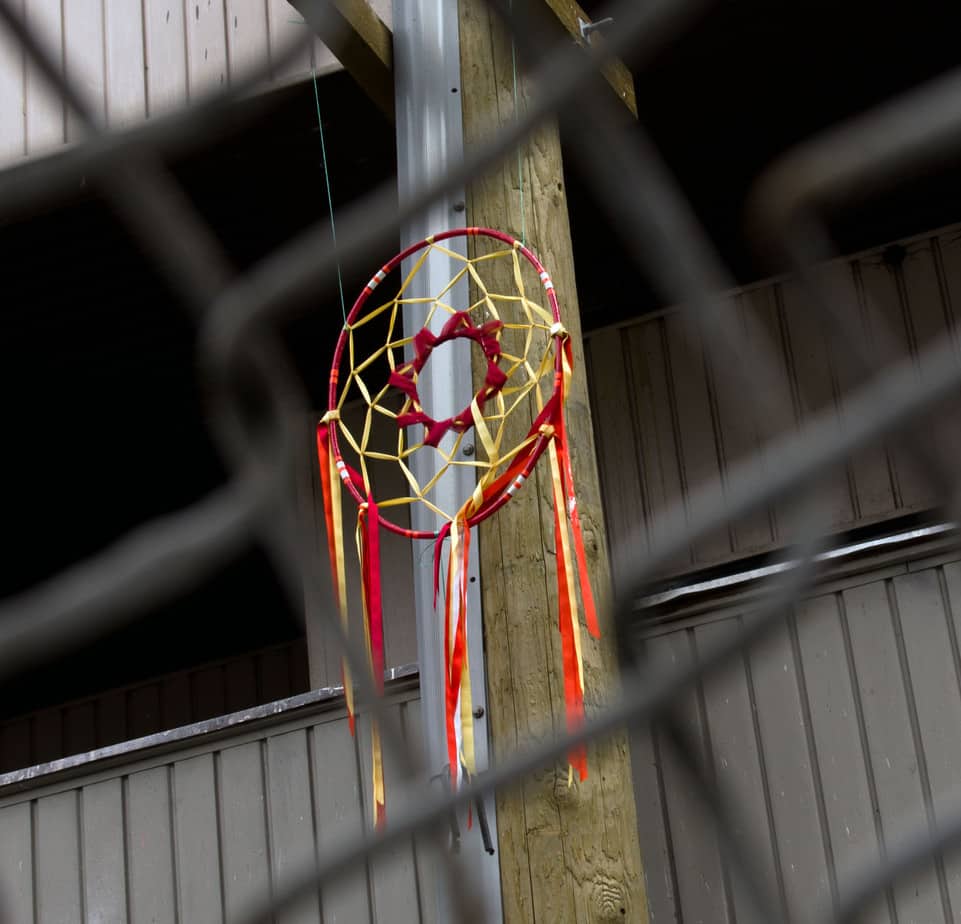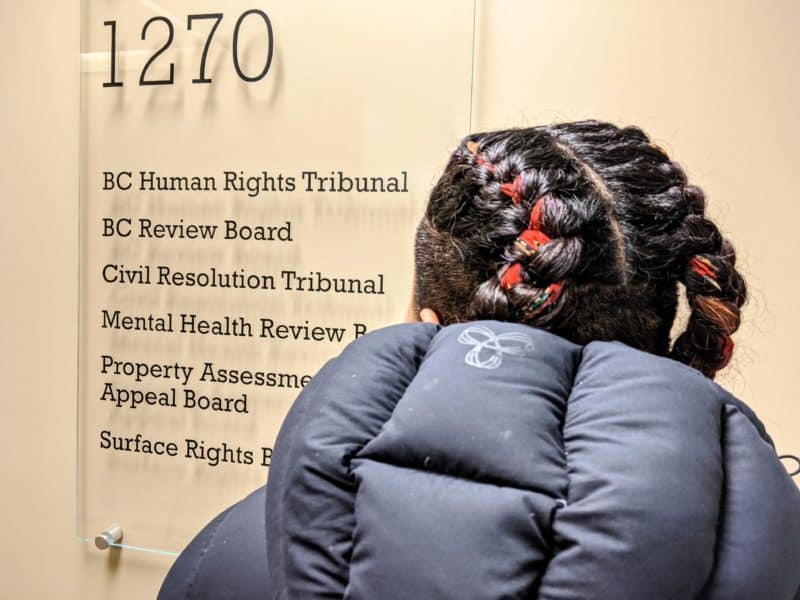
This is from our Urban Nation newsletter. You can subscribe here.
I was trying to tell a serious story to a crowd and they laughed. I didn’t set out deliberately to make them laugh but I’ll take it because I think I got my point across.
I was on stage at RavenSPEAK: Amplified, giving my presentation on Dec. 11 about the removal of John A. Macdonald’s statue from the front steps of Victoria’s city hall earlier this year. A group comprised of city council officials and the Saanich and Songhees First Nations made the recommendation to remove the statue as a gesture of reconciliation between the three.
The laughs had started right after the customary Indigenous land acknowledgements because my acknowledgment wasn’t so customary. In addition to the nations whose unceded home territory Vancouver sits on, I also acknowledged the urban East Van Nation. I said our territory lies between Nanaimo and Main streets on the east and west, and Cordova and Broadway on the north and south. Commercial Drive is our stronghold, and the Shaughnessy Golf and Country Club is our band office, I added. Cue up the laughs.
Laughs aside, Vancouver’s urban Indigenous people aren’t that visible. We don’t have a Chinatown, a Korean district or a South Asian end of town. And we are distinct from the First Nations’ reserves in the Lower Mainland.
But we are here. You don’t readily see us or notice us unless it’s Indigenous Day, but we count too, and we need to be heard.
We’re beginning to be heard more often now that The Discourse has shifted its reporting lens over to the Lower Mainland’s urban Indigenous community. Before, though, not so much. Other media such as the Georgia Straight and Vancouver Courier have long covered the occasional urban Indigenous story, and Angela Sterritt has been telling stories relevant to the urban Indigenous community for years. But at least until recently, coverage of our issues and the stories that matter to us has been inconsistent at best.
News about Indigenous people is usually about First Nations back home: land, rights, title, resources and court challenges. There’s nothing wrong with this, but it doesn’t reflect what is important to the 61,455 Indigenous people who called Greater Vancouver home in Statistics Canada’s last census. We need to ask what’s news to people in the urban nation — what do we think is important?
The Discourse has been trying to fill precisely this gap with our news coverage, and this newsletter. To all our new subscribers, welcome. My reporting partner Brielle Morgan and I look forward to telling more of our stories in the new year (right after we take a short break for the holidays). See you back in your inbox on Jan. 9, 2019.
People are talking about
- This story in The South African looks at how reconciliation started in South Africa 24 years ago and asks: is the country any closer to reconciling with its past?
- CBC News writes about a group calling for greater access to traditional foods by urban Indigenous people.
- The Vancouver Sun ran this story on the inaugural artist set to launch the Indigenous cultural residency program in Stanley Park.
- In this Vancouver Courier piece, a recent University of British Columbia teachers’ graduation ceremony showcased how Indigenous culture and tradition is being melded into the school’s ceremonies.
What makes life harder

Robin Garcia says she didn’t know she was “an inadequate parent” until she moved from the Sts’ailes reserve, out in the Fraser Valley, into Vancouver.
“I didn’t know that, you know, whooping my kids was something wrong. It was what I was taught,” she told a room full of Indigenous elders, youth workers, doctors, lawyers and counsellors, at a Circle of the Child training co-hosted by Ray-Cam Co-operative Centre on Nov. 23 in Vancouver.
“I thought that spanking them would teach them, you know, to listen, to do what they had to do. And I thought I was doing the best I could at the time.”
Robin was raised by her grandmother, who was a residential school survivor.
“I didn’t know that I had to do all these things, you know, so my child could be successful. You know, it’s pretty hard to raise your children in the right — in someone else’s ways of life. It’s not easy at all.”
For a long time, she says she struggled to trust people. It was hard for her to seek help when she needed it.
“I used to tell my children not to answer the door, don’t talk to the social workers, don’t talk to the schools. I never went to school meetings because I didn’t want to talk to them,” she said. “I was very closed off because I was scared. I was scared out of my wits to talk to someone … I felt so bad for what happened, that I got my children removed.”
Robin says she’s spent the past eight years working to heal.
“I’ve been fighting to be myself for a long time because all I know is abuse,” she said, over the phone. “I’d survived so much trauma. I have post-traumatic stress disorder and I’m disassociative.”
Therapy helps, she says. And so does sharing her story.
“The secrets that we have, we try not to tell,” she says. “It makes us ill. I know that if we don’t share what we went through, how are we supposed to get through it?”
Today several of Robin’s children have aged out of care, and four of her children live with her. She told the crowd at the Circle of the Child training that’s she’s proud her two-year old daughter can speak hən̓q̓əmin̓əm̓.
“She understands everything that I say in my Indian language. She doesn’t understand English too well,” she said. “Learning our language is important.”
Using a loud, clear voice, she said: “I’m fluent and I’m from Musqueam.”
What you love

Would you like to share what you love about being part of the urban Indigenous community?
Send your thoughts, contact info and a photo of yourself to brielle@thediscourse.ca. We’ll be in touch if we’d like to feature you in an upcoming newsletter.
Let’s gather
-
Dec. 24: If you’re young, Indigenous and a taco fan you might like to go to Yúusnewas’ taco/movie night. Yúusnewas hosts monthly events “by and for Indigenous youth to come together to share our culture and have great discussions about things like holistic well-being, harm reduction, sexuality, sexual health, HIV, and Hep C.” This is a free event for Indigenous people ages 14 and 29. Go to 205-568 Seymour St. in Vancouver.
-
Dec. 31: Indigenous Action Movement is hosting its annual DTES New Year’s Frybread Giveaway at Aboriginal Front Door from 3:30 p.m. to 6:00 p.m. You can help by donating ingredients: flour, baking powder, canola oil, jam, peanut butter, butter, etc. They’d also appreciate cupcakes, candies, napkins, lunch bags and warm clothing: gloves, toques, long-johns, socks, tights, etc. Finally, they’re looking for experienced frybread cooks. If you’d like to volunteer or donate, call Kat at 604-235-1403.
-
Jan. 4 to 6, 2019: Britannia Secondary School will host the second annual All My Relations basketball tournament. According to their site, the AMR team is made up of young Aboriginal women from various nations and backgrounds ranging in age from 17 to 40. If you want to cheer them on, check the site for the tournament schedule.
If you know about an event that you think should be included in this newsletter next week, send me an email.
And if you like this newsletter, help us build this community by inviting your friends to subscribe. [end]



